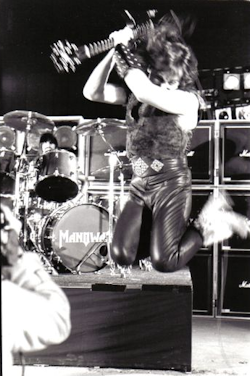
We have plenty to thank ROSS ‘THE BOSS’ FRIEDMAN for. In 1973 he formed the metalpunk pioneers THE DICTATORS, in 1980 his band SHAKIN’ STREET were opening for Black Sabbath when Dio introduced him to a bass player looking to start a new band. That opportune meeting paved the way for the one and only MANOWAR but our hero did not stop there. Still killing with power, this time with DEATH DEALER, YIANNIS STEFANIS charts the history of this true King Of Metal
Your first high-profile band, The Dictators, is considered by many to be the ultimate proto-punk band, among the main instigators of the legendary CBGB’s scene. Quite an accolade – what is your take on this?
“You know, that is a good question. I would say that The Dictators are… punk, like the Ramones were not like the safety-pins and torn-jeans Malcolm McLaren type of punk. We, in the United States and especially in New York, were more street punk. We were kids that were growing up in The Bronx and Queens but the same could be said about kids growing up in England, where the economy at the time was bad. For us things were less style-orientated and more street attitude.”
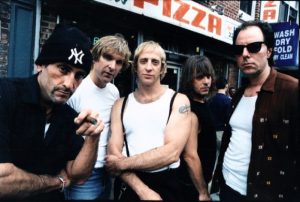 Back in the ’80s, a time when musical alliances were clearly defined, a band as cross-over as The Dictators must have been in perilous waters when it came to targeting the right audience, right?
Back in the ’80s, a time when musical alliances were clearly defined, a band as cross-over as The Dictators must have been in perilous waters when it came to targeting the right audience, right?
“That’s a very interesting point as The Dictators were too punk for the metal kids and too metal for the punk kids, so we kind of straddled categories the same way that a band like Motörhead does. Nowadays, no one thinks anything of it, you know? Metallica goes on and makes a garage record [‘Garage Inc’] and… they were going to do a Dictators song on that record but I think they did ‘Astronomy’ instead by my friend Albert Bouchard from Blue Oyster Cult. But that’s true: The Dictators were the kind of band that straddled heavy metal. The heavy metal element was because of me and the rest of the members of the band brought the whole punk attitude.”
Do you believe that being affiliated with both metal and punk you managed to reap the benefits of both scenes and that this was ultimately responsible for the band’s longevity?
“I think so, yes. As a result of that we were able to play in big arenas with bands like Blue Oyster Cult, as well as the intimate clubs that we were most familiar with.”
You are currently on tour with the band’s latest incarnation, The Dictators NYC. Was being able to perform with your old bandmates whenever you see fit, rather than whenever a label says so, a reason why you decided to re-activate this ensemble?
“Well, we have never officially broken up. We started back in ‘74 and we are still going strong – something I am very happy about.”
How does it feel when you go on stage and perform material that you first composed with The Dictators so many years ago?
“Fun, lots of fun! This music is ingrained in my DNA! We are now getting ready to do a tour in the Midwest during mid-September, playing places like Pittsburgh, Cleveland, Detroit and Chicago, which is very exciting. I mean, these songs are really part of who I am, as this was my first important band. We were signed to Columbia Records when I was 18, you know? We didn’t know any college – that was our college!”
Do you feel that your involvement in Manowar, given its high profile, has been beneficial to you in terms of attracting new audiences to The Dictators NYC?
“Oh, definitely! You could say that I am now going through the third phase of my career and that kind of past exposure is not hurtful to any of my current projects.”
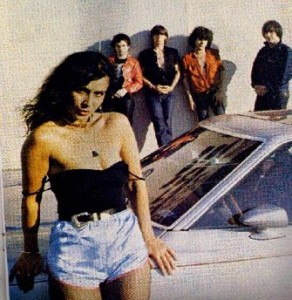 Having managed to create a name for yourself with The Dictators, in 1979 you decided to give that all up by moving continents and joining a fairly unknown French band by the name of Shakin’ Street. In this day and age, such a thing is common practice, but back in the late ’70s it must have been a pretty bold move. What prompted you to do such a thing?
Having managed to create a name for yourself with The Dictators, in 1979 you decided to give that all up by moving continents and joining a fairly unknown French band by the name of Shakin’ Street. In this day and age, such a thing is common practice, but back in the late ’70s it must have been a pretty bold move. What prompted you to do such a thing?
“Well, The Dictators went on a hiatus for a while and Sandy Pearlman, who was manager for both Blue Oyster Cult and The Dictators, discovered Shakin’ Street in Paris and, by that stage, the band was already signed to CBS. With Blue Oyster Cult already part of CBS, Sandy decided to also take over their management and suggested me as a replacement for their guitar player, Armick Tigrane, who had really screwed up and had, by that stage, become a junkie. So, Sandy suggested me, as he knew that I was looking for work and it all came together very quick. Changing continents was a cultural shock, as I was a kid coming from the Bronx but, rather than being hostile, everybody was super nice to me. I mean, I was in a French band that was signed to CBS France and I travelled all this way to help them with their career. I’ve got to be honest with you: I was very much welcomed in France and I made a lot of friends over there which, to this day, I still have. It was a brave move in a way, but I was young and I wanted to go out and experience the world. But, then again, we decided to record [Shakin’ Street’] in San Francisco, so I moved to France for a year but we went back and forth. I did get to see France from a very interesting perspective for about 50 to 60 shows – better than most people from the US could claim to have seen at the time.”
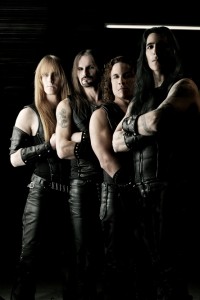 That musical relationship did not last very long, as it was around the beginning of the ’80s that you started hanging out with Joey DeMaio, right?
That musical relationship did not last very long, as it was around the beginning of the ’80s that you started hanging out with Joey DeMaio, right?
“Yes, and the story goes like this. We were out on tour and we found ourselves performing on the ‘Heaven And Hell’ tour as Sandy Pearlman had begun managing Black Sabbath at the time. So, he got us on the tour and it was when we were playing England… I think it was when we were playing at the Newcastle City Hall… that I saw Ronnie James Dio standing there and he turned and said to me: ‘Hi Ross, I am Ronnie’ to which I replied: ‘I know who you are, Sir!’. He told me how much he loved The Dictators, how familiar he was with the whole CBGB scene and how much he liked my guitar playing and then turned and said: ‘By the way, we have this guy in our crew whose name is Joey who plays bass and I think that you should meet him’. I looked around for him after my chat with Ronnie and when I found Joey I introduced myself to him and we started talking. I remember him telling me: ‘You are a very good guitar player, so is this [Shakin’ Stree] what you want to do? You are really good and I am looking to do something – I am looking to create something extraordinary’. That is when we started talking about what we liked in music and, of course, we were on tour with Black Sabbath who are the gods for us, you know? To me they are gods, they are far out – that’s it! I wanted to have a band like Black Sabbath, I wanted to have a band like The Who, Cream or Grand Funk Railroad – all these power trios with an added top singer. It was after we realised that we wanted the very same thing that we decided to form a band together. We were jamming together when Black Sabbath were performing on stage. We would go to the dressing room and we would start blasting away our stuff on their warm-up amps. Every time Black Sabbath would finish one of their songs they would hear us playing in the background. Ronnie James Dio was responsible for Manowar coming together!”
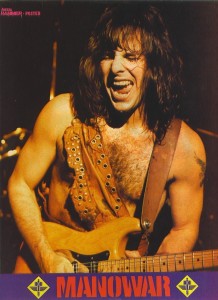 What was it about Joey that made you decide that it would be a good idea to start a band together?
What was it about Joey that made you decide that it would be a good idea to start a band together?
“Well, the first thing that I noticed and I liked about him was his uniqueness. I had never met anybody like him before. His personality… he was pretty crazy. We are both from New York State, but he is from the western part and it is a whole different mind-set there. I liked the way he talked and his sense of humour and it was not long before we became close friends and partners in this new project… not even to mention the way he played the bass! I have never seen anyone play bass like that! I could really see that this guy is pretty much the next level, you know? This would be the next great bass player in our genre, a lead bass player in the vein of Chris Squire [Yes]. I had connections with people from EMI who were looking to sign a new band at the time and that band turned out to be Manowar.”
Looking closely at your career with Manowar, one cannot fail to detect the fact that your personal input as a composer seems to focus mostly on the first couple of albums and that from then on Joey tends to lead the way. Is that an accurate assessment?
“It is a very accurate assessment indeed. Something definitely started to change in the band along the way. As you can see, the person that wrote all the songs on ‘Battle Hymns’ was me and, you know… what happened was that Joey wanted to take control of the whole band, which he did. Initially we were partners together and when you are partners with someone, everything should be fifty-fifty. He didn’t like fifty-fifty! That’s okay, I guess. I mean, being in a band is like being in a marriage, you know? Sooner or later that marriage started to go south. The break up was not my idea. I never left Manowar, I was asked to leave! Even though I was not having such a good time, that did not mean that I wanted to leave the band. My attitude was: ‘Let’s work our stuff out, let’s go through this together’, but Joey didn’t want anything to do with it. It was his way or the highway. I know that there are a lot of Manowar fans who cannot believe that I was asked to leave the band but that is the truth. Were we at the best point in our relationship? No, but people get through that. Look at Steven Tyler and Joe Perry – things like that happen, you know?”
In the ’80s, access to information regarding the state of the band was almost non-existent, so seeing you leave straight after the release of an album as impressive as ‘Kings Of Metal’ was shocking, to say the least.
“And what made things even more crazy was the fact that I was literally asked to leave days prior to the release of the album. So, all the work that we did, all the blood sweat and tears, all those sacrifices and struggles that we had to put up with over the years just began to pay off and I was not there to enjoy it. Why would you make such a decision right before the release of your biggest record and replace me with someone like David [Shankle]? I mean, I love the guy but… we machine-gunned our first six records in six years, we made a name for ourselves and then all of a sudden… it just didn’t make any sense but that’s how it was and thus is how Joey wanted it, so he knows better than anybody. Anyway, the whole Manowar thing is like a cult right now. I don’t see them gaining any new fans, but you never know… It’s not like the music that they put out now is bad – it’s not bad, but it’s not what it was before.”
Do you think the ‘True Metal versus False Metal’ ideal that the band passionately promotes has been slightly off-putting to some?
“I hate that stuff, man. To me that was the worst thing Joey ever said and it did set us up for humiliation in the end.”
Back in 2005 you and other past members joined the band on stage at a very memorable Earthshaker Festival appearance, which your fans speak about to this day. If you were asked to do it again, would you consider it?
“With Manowar? I… I wouldn’t say no, but I would say that the chances of that right now are slim to none, judging from my relationship right now with Joey. It was bad enough after ‘New Metal Leader’ [The band Ross The Boss’ debut album] came out, as the knucklehead label turned and said: ‘Oh, this is the best record since ‘Kings of Metal’’, just to stick it to Joey, and I didn’t know anything about that! The band knew nothing about that and we went crazy when we saw the ad. I mean, how can you do such a thing? How can you say that? Obviously, certain people had issues with Joey and they used us to get back at him. There is a lot of anger in the industry in relation to him. Before that, I used to think that there might be some hope of us talking again, but now – forget it!”
You released two very good quality albums under the Ross The Boss moniker. With your involvement in various different projects at this point in your career, some people feel that the life of this specific band has come to an abrupt end. Care to clarify?
“Well, I would say that Ross The Boss is still an active band, but I don’t know at this stage how and when it’s going to come back. I have a contractual obligation with AFM Records, but I have to find time in my life as well as the much-needed energy to release a new album. Right now, I have two projects that have my full attention and these are Death Dealer and The Dictators NYC.”
There is not much separating a band like Ross The Boss and Death Dealer when it comes to style and energy, so why did you choose to invest your time in a new working band, instead of focusing further on your own band?
“Well, what is important is that I did not start Death Dealer. The band was formed by Sean Peck [vocals] and Stu Marshall [guitar] – I was the third guy in. Twenty months ago they contacted me through Facebook a few weeks prior to the presidential elections here in the US and, amongst other things, we found out that we shared similar political beliefs, which helped us bond further. I was asked whether I would be interested in playing a few songs with them and I mean, why not? Next, I heard from Stu, that big Aussie guy, who told me how much he likes me as a musician and how he would love to play with me in a band, which was quite flattering indeed. A day or so later, Sean explained what the whole concept with Death Dealer was to be and I liked the idea enough to join in. I would never do something if I am not super excited about it and this is a project that I am fully committed to. I love the record we did together [‘War Master’]. All the songs that we wrote together were great and the whole creative process was fantastic. The reaction we are getting from fans is great and it seems like we have already quite a loyal following.”
You have, in the past, been quite outspoken about illegal downloading and how it affects you on a professional level. Have your views on this topic changed at all?
“The music industry will never be like it was in the ’80s, I can tell you that. The Digital Age has not only destroyed the music itself, it has also destroyed music studios as we know them and a lot of other things. Having said that, it is also responsible for creating Death Dealer because without the internet, we would not have this band. Now, the piracy thing: to me it’s just criminal! Everyone is affected at every level and it has to stop.”
Looking at your current schedule, there are a great number of projects lined up, which will surely keep you busy for the next few months. What is it exactly that your fans should be looking forward to?
“I am going to be in Los Angeles in order to take part in an event called The Rock And Roll Autograph Show. A lot of what we do is for different children’s charity organisations. What they do is that they book a hotel, they bring all these different celebrities together and people pay a set amount to gain access to the venue and, in return, they get to talk to their favourite celebrities. Celebs get to bring memorabilia with them to sell and offer any of the proceedings to the charity if they so wish. It is a great money-maker and most of it goes to charity, which is a good thing. With regards Death Dealer, there is going to be a major announcement taking place soon, which involves an arena tour in South America and maybe Asia. I cannot tell you more at this moment in time but I would suggest that you check our website soon for more info. November will be a very important month, both for me and Death Dealer.”
Originally printed in Iron Fist #7
Copyright © 2024 Iron Fist Magazine. All Rights Reserved.